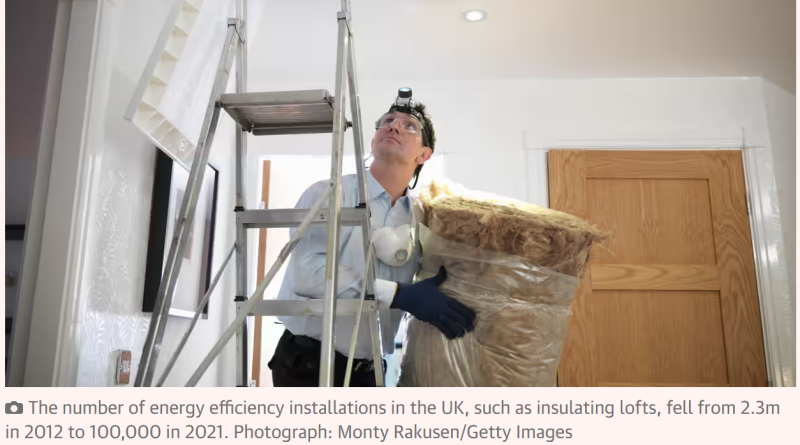Analysis In the race for new energy strategies, why does home insulation always lag behind?

In the battle for Downing Street, only the most eyecatching political policies are given a chance to shine, and insulating Britain’s draughty homes seldom makes the grade.
It would be a challenge for any policy commentator to find a subject with less political star power than the polystyrene, wood fibre and foam that makes up the home insulation so desperately needed across the UK.
But a growing number of experts have warned that it is no exaggeration to say that Britain faces an insulation crisis that requires the next government to prioritise the problem as a national infrastructure emergency.
The UK’s housing stock is some of the least efficient in Europe and means that millions of families are living in fuel poverty – unable to pay their energy bills and piling pressure on health services as their mental and physical wellbeing succumbs to the cold and damp.
It also costs the country billions of pounds in energy expenditure every year by keeping Britain reliant on higher gas imports, and leaves all homes and businesses exposed to the volatility of global gas markets.
Crucially, Britain’s legally binding climate targets are also in jeopardy without reducing the carbon dioxide emissions from home heating, which makes up almost a fifth of the UK’s total emissions.
But in the last week, warring politicians have focused the debate on home energy bills squarely on the Labour party’s plan to establish Great British Energy to take a stake in clean energy projects.
GB Energy has emerged as one of the party’s most popular policies, helped by the claim of the shadow energy secretary, Ed Miliband, that it could help households save £300 a year on gas and power by investing £8.3bn over the duration of the parliament in more renewable energy.
The promise was based on calculations by independent thinktank Ember, which found last year that bills could be far lower by 2030 if Britain replaced its reliance on gas with a largely clean power system.
The Conservatives have accused Labour of misleading voters, calling GB Energy a “gimmick” based on outdated data.
It is true that Labour’s calculations no longer reflect today’s energy market prices, which have fallen since last year, meaning that the savings would be lower too.
But Ember maintains that the cleaner Britain’s energy system becomes, the cheaper bills will be for households – even when taking into account the cost of upgrading the electricity grid.
Meanwhile, the Conservatives believe the answer to lower home energy bills lies in wringing more gas from Britain’s own reserves in the North Sea, a claim that has been debunked.
But neither side on the energy bills debate discusses tackling the home energy efficiency challenge with the firepower it warrants.
Britain’s home insulation efforts have collapsed in recent years. After reaching a peak in 2012 of 2.3m upgrades, the government slashed efficiency programmes in the same year, leading to a slump in home upgrades. By 2021, annual installations were 96% lower, at fewer than 100,000.
The Energy Saving Trust estimates that basic loft insulation, one of the easiest and most affordable upgrades, could help a mid-terrace home save an average of £225 a year on its energy bill, or £415 a year for a detached house. For the coldest and draughtiest homes, these savings could be higher.
While Keir Starmer might not have been vocal in addressing the issue, Labour’s manifesto does acknowledge it – the party has promised to double the government’s £6.6bn spending plan to upgrade up to 5m homes across the country over the next parliament.
In many ways this is a far more ambitious plan than the £8.6bn put forward for GB Energy, but it is still unlikely to attract the attention that it deserves.
Beyond its first term, Labour would aim to ensure that every home has an energy performance certificate rating of C or higher by 2035, according to the manifesto. For bill payers, these savings would be instant and lasting. For Britain, they could add up to meaningful reduction in carbon emissions and reliance on gas imported via the global markets.





